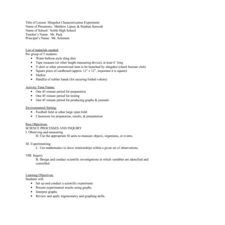Curated OER
Vectors
Students differentiate distance and displacement. In this physics activity, students use formulas to calculate for displacement. They draw vectors using the grid.
Santa Monica College
The Properties of Oxygen Gas
Scholars generate and collect pure oxygen through a decomposition reaction of hydrogen peroxide in the fourth lesson of an 11-part series. Then, they complete six investigations into the properties of oxygen.
Curated OER
Slingshot Characterization Experiment
Students set up and conduct a scientific experiment to demonstrate data collection. In this scientific process lesson, students complete an activity with the specific objective of using a slingshot to fire a t-shirt into the crowd at a...
Curated OER
Wind Effects on Model Building: Pre-Lab for Truss Design and Testing
Emerging engineers perform pre-lab calculations in this first of a three-part lesson on model building. They determine the forces of tension and compression in a truss. After completion of the worksheet, pupils will draw a draft of their...
Curated OER
A Focus on Mechanical Friction
Young scholars explore mechanical friction. They perform experiments to observe the direction of mechanical motion and the difference between rolling and sliding friction. Data results on the experiments are recorded and students...
Curated OER
Sciences Working Together
Students research articles about science technology and society. In this science and technology lesson, students answer questions about an article they chose. They share what they learned with their peers.
Curated OER
Impulse and Momentum
Learners are introduced to the concepts of impulse and momentum and problem solving strategies for these types of problems. In groups, they discover the law of conservation of momentum and share their answers with the class.
Science Struck
Science Struck: Guide to Free Body Diagrams in Physics
A detailed explanation of the different types of forces that can be applied to an object and how to represent them in a free body diagram. Includes examples and some practice problems to try, with solutions provided.
CK-12 Foundation
Ck 12: Episd: Free Body Diagrams
[Free Registration/Login may be required to access all resource tools.] Students will understand how to read and create free body diagrams.
Khan Academy
Khan Academy: Introduction to Forces and Free Body Diagrams Review
Review the key concepts and skills for forces, including how to draw free body diagrams.
Physics Classroom
The Physics Classroom: Newtons Laws: Free Body Diagram Interactive
A skill-building tool that presents students with twelve situations for which they must construct free-body diagrams. Force arrows allow user to toggle the magnitude of the force. Feedback is immediate; opportunities to correct answers...
Physics Classroom
The Physics Classroom: Newton's Laws: Drawing Free Body Diagrams
Students practice reading situations where forces are acting upon objects in all directions and magnitudes, and then draw free-body diagrams to represent the forces. Each problem has a self-checking key linked right on the page.
Sophia Learning
Sophia: Free Body Diagram: Lesson 2
This lesson introduces the concept of the free-body diagram. It is 2 of 2 in the series titled "Free-Body Diagram."
Physics Classroom
The Physics Classroom: Newton's Laws: Double Trouble
Through the use of free-body diagrams and Newton's laws, students analyze the motion of two objects together.
Georgia Department of Education
Ga Virtual Learning: Ap Physics 1: Applications of Newton's Laws of Motion
Students apply Newton's laws to more diverse physical settings where multiple forces from varying origins interact. To aid in condensing the physical setting into mathematical expressions, the free body diagram is used in this module...
CK-12 Foundation
Ck 12: Physics Simulation: Free Body Simulation
Learn to draw free-body diagrams in this simulation where you place arrows to indicate the directions that forces are acting on an object.
CK-12 Foundation
Ck 12: Physics: Newton's Laws Study Guide
This study guide on Newton's Laws covers key terms, the three laws, free body diagrams, friction coefficients and tension. Includes equations and an example problem with solution. It is available for download with free registration.
Physics Classroom
The Physics Classroom: Circular and Satellite Motion: Newton's 2nd Law Revisited
In this interactive module, students use free-body diagrams, Newton's second law equation, and circular motion concepts to analyze a variety of physical situations involving the motion of objects in circles or along curved paths.
Physics Classroom
The Physics Classroom: Newton's Laws: Balanced and Unbalanced Forces
Students study several free-body diagrams to better understand balanced and unbalanced forces.
CK-12 Foundation
Ck 12: Physics Simulation: Pirate Ship
[Free Registration/Login Required] Learn about Newton's 3rd Law, and how the concept of the 'force pair' allows us to understand interactions between objects using this interactive simulation. A PDF worksheet and a video tutorial are...
Physics Classroom
The Physics Classroom: Newton's Laws
A four-lesson e-textbook covering topics in Newton's Laws. Tutorials include informational text,animations, interactive activities, and quick, interactive comprehension checks throughout the lessons.
Physics Classroom
The Physics Classroom: Free Fall and Air Resistance
This lesson in high school physics on Newton's Second Law of Motion provides a discussion of free fall and air resistance, and answers, "Why do objects which encounter air resistance ultimately reach a terminal velocity?" and "In...
Physics Classroom
The Physics Classroom: Motion and Forces in Two Dimensions: Vector Addition
In this physics tutorial, the task of summing vectors will be extended to cases in which the vectors are directed in directions other than purely vertical and horizontal.
Georgia Department of Education
Ga Virtual Learning: Ap Physics 1: Newton's Laws of Motion
Newton's three laws are deceptively simple, but they are the underpinning of all of physics and govern the mechanics all of your actions in everyday life. Take an in-depth look at these laws in this learning module.












